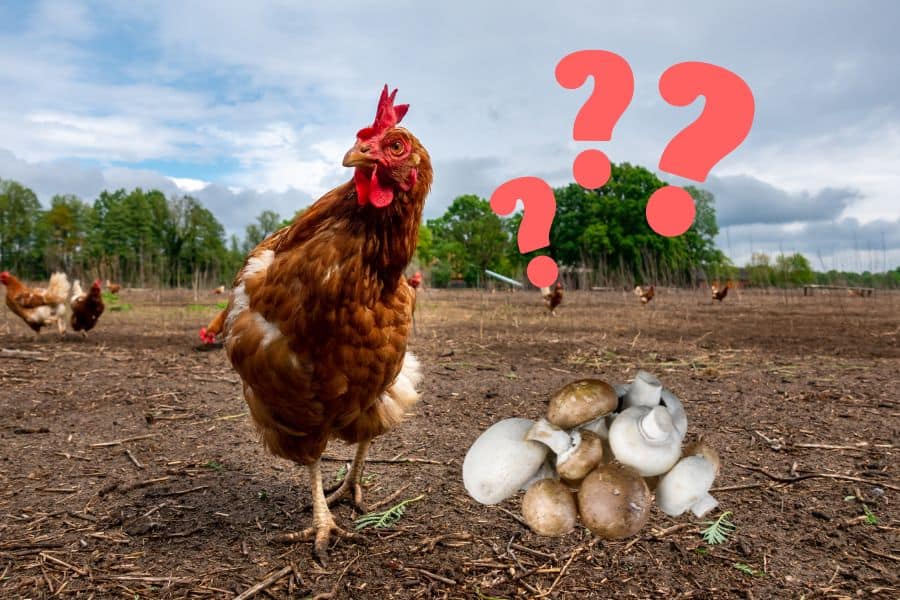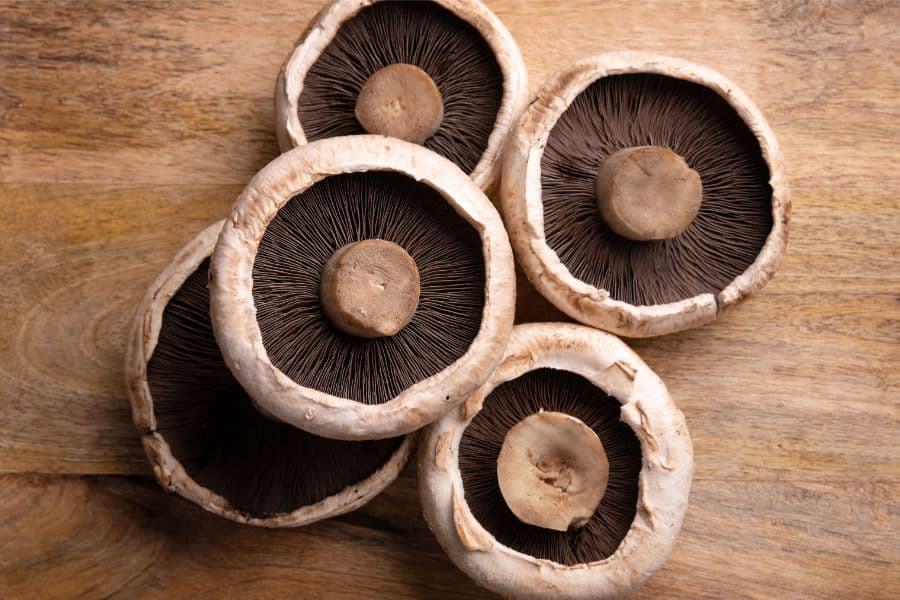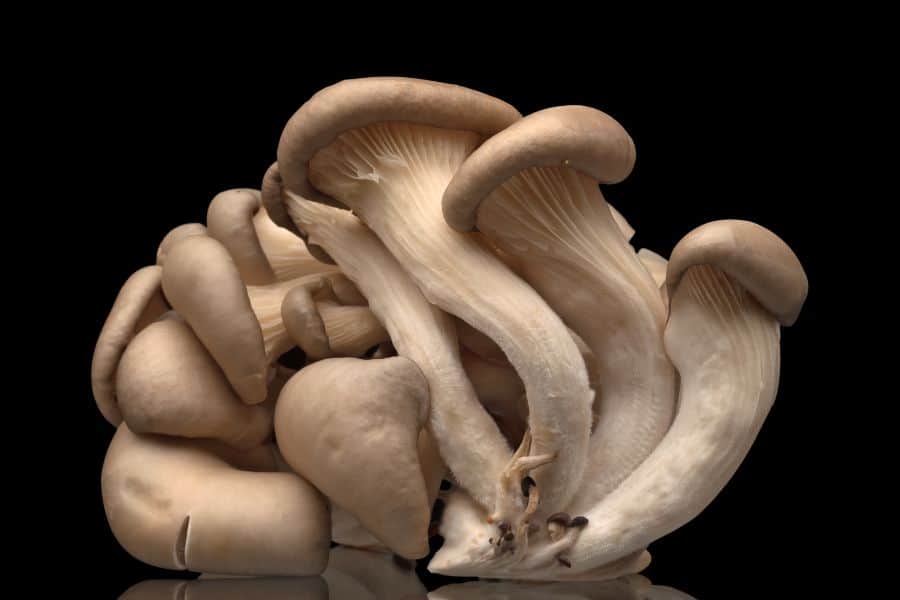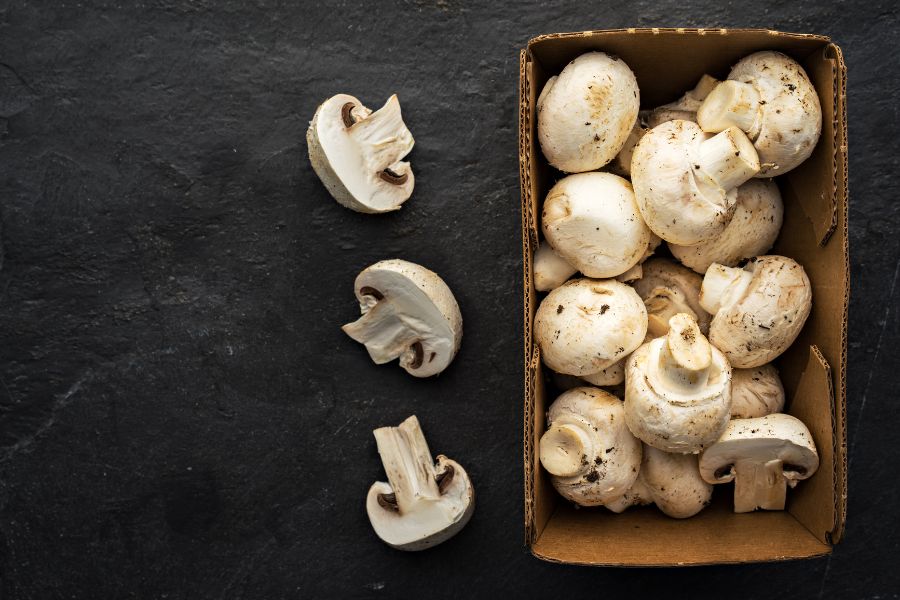If you’re a mushroom enthusiast and a chicken parent at the same time, you might be wondering whether it’s okay to spread your love for fungi to your feathered friends. After all, while chickens aren’t finicky about what they eat, not everything is good for their health.
So, are mushrooms safe for chickens?
Well, we don’t have a simple answer to this question – it could be a “no” or a “yes”, depending on what mushrooms we’re referring to here.
In today’s blog post, we’ll cover everything you need to know about feeding this spore-bearing fruit to your flock. So, before you toss that morsel of mushroom to your feathery friend, get the facts straight.
Are Mushrooms Safe For Chickens?
Yes, mushrooms are safe for chickens to eat, but not all mushroom species. Only give your feathery pet the safe kind to keep them healthy and happy. With proper feeding practices, your flock can enjoy mushrooms without harming their health.
Chickens eat almost everything, including mushrooms. But that doesn’t mean they’ll always go for what’s safe for their health.
As a chicken caregiver, it’s up to you to carefully select what you offer your birds to avoid the health risks of eating something they shouldn’t.
Mushrooms have over 10,000 species. Unfortunately, not all these varieties are safe for chickens to eat, with about 20% of this number considered poisonous for humans and chickens alike.
That’s why if you’re considering making mushrooms part of your chickens’ diet, you must be careful. Know the varieties you’re working with and ensure they’re safe for your birds.
Safe Mushroom Species For Your Chickens
The general rule is to only feed your feathered friends mushroom species considered safe for humans. Some of these varieties include Portobello, oyster, and button mushroom species.
Portobello Mushroom
Portobello mushrooms are safe for chickens to eat. The species doesn’t contain any toxic compounds, is tasty, and has lots of benefits to deliver to your poultry.
But as with any other treat, offer portobello mushrooms as an occasional treat and in moderation.
Portobello mushrooms, and mushrooms in general, have a high nutritional load. However, they don’t pack all the nutrients necessary for your flock’s all-rounded health, so use the fungi as an occasional treat and not as a main diet.
Oyster Mushrooms
Scientifically known as Pleurotus ostreatus, oyster mushrooms have a shell-like appearance and generally resemble oysters, which is where they get their name. This fungi species is one of the newest mushroom varieties and is safe for eating by chickens.
Several studies and expert insights suggest that oyster mushrooms help lower cholesterol levels, alleviate pain, boost brain health, block cancer growth, prevent cell damage by free radicals, and many more benefits.
As such, making it part of your chickens’ diet will give your flock a tasty treat and, at the same time, help keep their health in good shape.
Button Mushrooms
Button mushrooms, also known as common, white, or cremini mushrooms, are another common variety. In fact, this is the kind you’re more likely to find in restaurants. It’s good for humans, so chickens can have it too.
But before offering it to your birds, know that this variety isn’t entirely safe for your poultry. According to a 2020 National Library of Medicine report, this species may contain hydrazines, a carcinogenic toxin, albeit in negligible amounts.
To avoid any risks, only opt for cooked button mushrooms. Cooking significantly reduces toxicity levels and makes the snack even more appealing to your flock.
Other Common Edible Mushroom Species
Other than portobello, oyster, and button mushrooms, we have many other species safe for chickens.
Some of the popular ones include:
- Lion’s mane
- Shiitake
- Maitake
- Reishi
- Chicken of the Woods
- Morel
It’s important to note that no matter the species you choose, offering mushrooms as a treat and not as a main diet is good. Mushrooms work best when serving as occasional treats and not anything beyond that.
Mushroom Species To Never Feed Chickens
The list of poisonous mushroom varieties is extensive, and we can’t exhaust it in this article. However, we’ll provide some common species to avoid.
These species are also considered toxic to humans and include:
- Death cap
- False champignon
- False morels
- Destroying angel
- False parasol
- Ivory funnel
- Webcaps
- Autumn skullcap
Go For Store-bought Mushrooms
Unless you’re an experienced mycologist or a seasoned mushroom expert, you’ll have trouble cherry-picking safe mushroom species from toxic ones.
But there’s an easy way to play it safe – feeding your chickens mushrooms from grocery stores.
That’s right!
You see, varieties in grocery stores are generally intended for human consumption and are, therefore, safe for your feathered friends.
Of course, you still have to be careful with the condition of the mushroom you buy. Go for a fresh supply if you want to offer the very best to your flock.
Discolored, slimy, and smelly mushrooms should be a no-no. Any of these signs imply that the fungi is past its prime days and isn’t safe for consumption, whether by chickens or humans.
Outside the grocery stores, your garden is the other place to obtain a safe supply of these fungi. If you’re cultivating mushrooms for your consumption, they should also be safe for the flock.
Remember the simple mushroom rule – if it works well for you, it also works well for your flock!
Raw Or Cooked Mushrooms – What Works Best For Chickens?
Some foods work best for chickens while raw rather than cooked. That includes leafy greens like kale, spinach, and lettuce; fruits such as apples, bananas, and watermelons; and vegetables like cucumbers, bell peppers, and carrots.
Foods like mealworms, insects, earthworms, and other options that, technically speaking, aren’t considered raw foods also fall under this category; they’re best served to chickens in their natural state.
However, as for some foods, they’re more appealing and safer for chickens when offered in cooked form. That includes meat, fish, and some legumes, to mention but a few. Cooking makes these foods more digestible and enhances their safety.
Speaking of mushrooms, your chickens can do them either raw or cooked. As long as you choose an edible variety and follow the necessary preparation measures, you can give them to your flock in either form; cooked or raw.
But then, one thing you should be aware of is that raw mushrooms have a rubbery texture that can be an easy turn-off for most chickens. Chickens love easy snacks, and the texture of raw mushrooms makes it difficult to peek at them.
It’s always a good idea to cook mushrooms before offering them to chickens. Cooking will reduce the texture and make the treat more attractive to chickens. Plus, cooking may kill toxins that would otherwise be a health threat to your birds.
Health Benefits Of Feeding Chickens Mushrooms
Before incorporating mushrooms into your chickens’ diet, understand how this treat can benefit your flock. As a responsible chicken parent, it won’t make sense to bring on board any food just for the sake of doing it.
Now, mushrooms are loaded with nutrients and have many health benefits to offer your birds. For instance, they contain some amount of proteins, an essential nutrient that helps support the growth and development of muscle tissues.
In addition, some species like reishi and shiitake are rich in antioxidants, which basically are compounds that help fight the effects of free radicals and generally improve your flock’s immune system.
Also, feeding your poultry mushrooms will supply your flock with essential vitamins and minerals. The fungi are generally rich in potassium, zinc, phosphorus, copper, thiamine, B vitamins, and several other nutrients crucial for your birds’ health.
How To Prepare Chickens Mushrooms
Choosing the right variety isn’t enough. You need to also pay attention to how you prepare and serve mushrooms to your feathery friends.
After buying mushrooms from the grocery store (or getting it from your yard), wash them well to remove any dust and chemical residue. Use freshwater for this and keep it thorough to remove any dangerous compounds on the surface.
Then, cut the mushrooms into small bite-sized squares. If your chickens love the treat more when raw than cooked, offer it uncooked.
However, if it’s the first time you’re offering mushrooms and you don’t know your chicken’s preference, most birds will often go for the cooked version presented with the two options. Use a non-stick skillet to cook them over low to medium heat.
Be sure to avoid adding any oil, salt, or any other seasonings or additives. Otherwise, the treat will be more likely to cause your flock harm than benefit it.
Cook the mushrooms for about 5 to 10 minutes, depending on their thickness, with the thicker kinds spending more time in the heat.
Proper Way of Serving Mushrooms to Chickens
Once ready, it’s time to serve. Keep the moderation rule in mind. You can serve the mushrooms alone, but your chickens will likely enjoy them more when mixed up in their daily feed.
The other clever way of serving mushrooms is offering them alongside other snacks. But again, that would require you to be more careful so that the snacks don’t take up the place meant for the main food.
Chickens’ Alternative Treats to Mushroom
If, for whatever reason, you don’t want to feed your flock mushroom, or maybe they don’t like it, don’t worry! We’ve got lots of other healthy treats that you can use in place of the fungi.
Some of these options are even more appealing to chickens, so they have minimal chances of turning their beaks up at the snacks.
Examples include:
- Leafy greens: Cabbage, broccoli, spinach, kale, and lettuce
- Herbs: Cilantro, mint, oregano, and basil
- Grains: corn, oat, barley, and wheat
- Insects and worms: Spiders, roaches, crickets, mealworms, and earthworms.
- Fruits: Apples, watermelon, berries, and bananas.
- Vegetables: Cucumbers, carrots, zucchini, capsicum, and tomatoes.
All of these snacks are healthy for chickens. But for the plant-based, only work with the organic type to avoid all the troubles of pesticides and other farm chemicals.
Also, keep in mind that moderation is key. The appropriate amount to offer your chickens will depend on the type of treat and the health condition of your flock.
If you aren’t sure how much of a treat is safe for your chickens, you can always consider working with an expert in the field. It will help you reap the benefits of feeding your birds these treats when avoiding the dangers of feeding malpractices.
Also Read:
Conclusion
Mushrooms can be good or bad for chickens depending on the variety you choose. Work with the edible species when feeding your chickens this treat, as they’re generally safe for your birds.
If you don’t know much about mushroom species, consult a mycologist or simply go for mushrooms sold in grocery stores. It will help you evade the risks of feeding a poisonous species to your bird.
And remember, mushrooms are meant to be a treat and should never substitute your chicken’s main diet. With proper selection, preparation, and presentation, you can safely incorporate this fungus into your flock’s diet, and they’ll immensely benefit from it.





